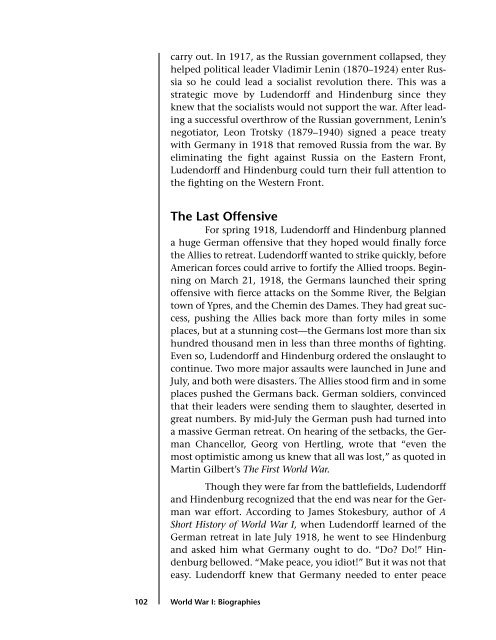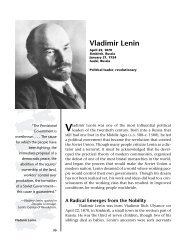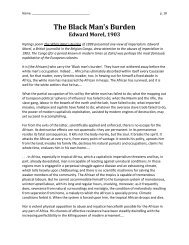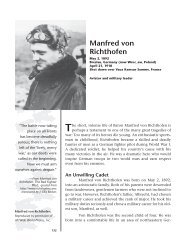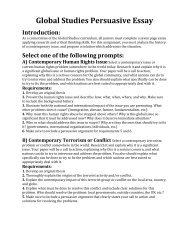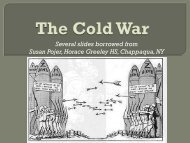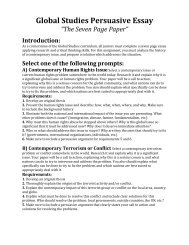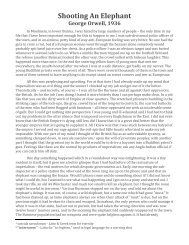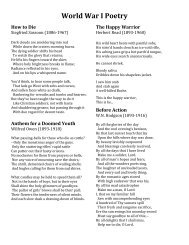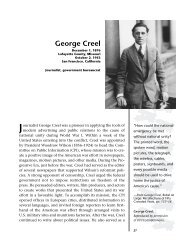Erich Ludendorff
Erich Ludendorff
Erich Ludendorff
You also want an ePaper? Increase the reach of your titles
YUMPU automatically turns print PDFs into web optimized ePapers that Google loves.
carry out. In 1917, as the Russian government collapsed, they<br />
helped political leader Vladimir Lenin (1870–1924) enter Russia<br />
so he could lead a socialist revolution there. This was a<br />
strategic move by <strong>Ludendorff</strong> and Hindenburg since they<br />
knew that the socialists would not support the war. After leading<br />
a successful overthrow of the Russian government, Lenin’s<br />
negotiator, Leon Trotsky (1879–1940) signed a peace treaty<br />
with Germany in 1918 that removed Russia from the war. By<br />
eliminating the fight against Russia on the Eastern Front,<br />
<strong>Ludendorff</strong> and Hindenburg could turn their full attention to<br />
the fighting on the Western Front.<br />
The Last Offensive<br />
For spring 1918, <strong>Ludendorff</strong> and Hindenburg planned<br />
a huge German offensive that they hoped would finally force<br />
the Allies to retreat. <strong>Ludendorff</strong> wanted to strike quickly, before<br />
American forces could arrive to fortify the Allied troops. Beginning<br />
on March 21, 1918, the Germans launched their spring<br />
offensive with fierce attacks on the Somme River, the Belgian<br />
town of Ypres, and the Chemin des Dames. They had great success,<br />
pushing the Allies back more than forty miles in some<br />
places, but at a stunning cost—the Germans lost more than six<br />
hundred thousand men in less than three months of fighting.<br />
Even so, <strong>Ludendorff</strong> and Hindenburg ordered the onslaught to<br />
continue. Two more major assaults were launched in June and<br />
July, and both were disasters. The Allies stood firm and in some<br />
places pushed the Germans back. German soldiers, convinced<br />
that their leaders were sending them to slaughter, deserted in<br />
great numbers. By mid-July the German push had turned into<br />
a massive German retreat. On hearing of the setbacks, the German<br />
Chancellor, Georg von Hertling, wrote that “even the<br />
most optimistic among us knew that all was lost,” as quoted in<br />
Martin Gilbert’s The First World War.<br />
Though they were far from the battlefields, <strong>Ludendorff</strong><br />
and Hindenburg recognized that the end was near for the German<br />
war effort. According to James Stokesbury, author of A<br />
Short History of World War I, when <strong>Ludendorff</strong> learned of the<br />
German retreat in late July 1918, he went to see Hindenburg<br />
and asked him what Germany ought to do. “Do Do!” Hindenburg<br />
bellowed. “Make peace, you idiot!” But it was not that<br />
easy. <strong>Ludendorff</strong> knew that Germany needed to enter peace<br />
102 World War I: Biographies


